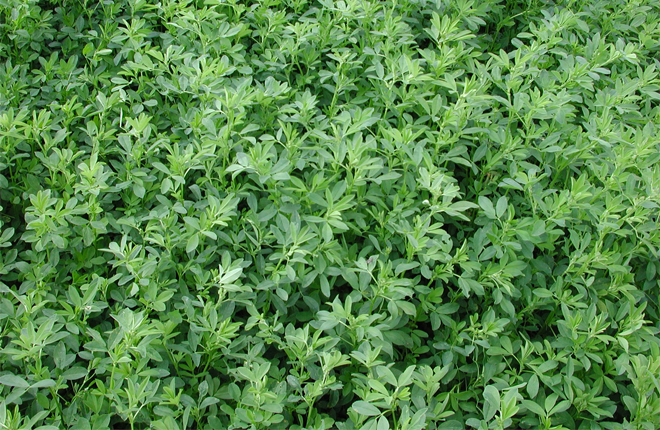Organic Seed Treatment for Alfalfa
Alfalfa is a $10 billion-a-year crop in the United States and is produced in all 50 states. It fixes nitrogen in the soil, saving an estimated $457 million a year in fertilizer costs, and reduces pests and plant pathogens when rotated between crops of corn and soybeans. Its roots also capture nutrients in the soil so that fewer of them flow into waterways.
Producing alfalfa, however, can be challenging. Farmers in the Midwest often plant it early in the spring when the soil is cold and damp. That makes the seeds vulnerable to a number of soil borne diseases. To minimize the damage, most alfalfa seeds are coated with a fungicidal treatment. But the treatment, mefenoxam, is ineffective against the pathogen causing Aphanomyces root rot (ARR) common to Midwestern soils.
Demand for organic alfalfa for organic dairy operations is increasing, and alfalfa treated with a fungicide doesn’t qualify. “Many organic dairy farmers would like to expand, but they essentially face a roadblock because of a lack of available organic feed. That is something we would like to address,” says Deborah Samac, a plant pathologist at the Agricultural Research Service’s Plant Science Research Unit in St. Paul, Minnesota.
Samac wanted to see if alfalfa seeds coated with a naturally occurring mineral would protect them from the soil diseases that attack alfalfa, including ARR. The mineral, zeolite, comes from degraded volcanic rock, has antifungal activity, and qualifies as an organic soil treatment. It is now used on golf courses to enhance water infiltration and the water-holding capacity of the soil. As part of her study, Samac also wanted to assess zeolite’s effects on beneficial microbes in the soil and on the health of plant roots.
Samac and her colleagues grew plants with three different seed treatments and inoculated them with the types of pathogens that attack alfalfa roots. The seed treatments included a control with no fungicide, mefenoxam-treated seeds, and commercially available zeolite-coated seeds designed for organic alfalfa production. The plants were removed after 21 days and rated for disease symptoms on a 1-to-5 scale. The researchers also repeated the process in soils collected from 12 alfalfa fields in Minnesota to assess the treatment’s effectiveness in soil naturally infested with pathogens.
The results showed that the mineral seed coating was as effective as mefanoxamin protecting seeds from most soil pathogens, but unlike mefanoxam, the zeolite protected the seeds from ARR. It also did not inhibit production of healthy roots or beneficial microbes in the soil. Samac says that although the coated seeds need to be evaluated further, the findings show they could prove to be a useful tool for both conventional and organic alfalfa operations.— By Dennis O’Brien, Agricultural Research Service Information Staff.
“Organic Seed Treatment for Alfalfa” was published in the July 2015 issue of AgResearch Magazine.
Key Facts
- New alfalfa seed coating made from natural mineral.
- Coating is highly effective against several soilborne plant pathogens.
- Allows organic growers to plant earlier in spring.
- Works against Aphanomyces root rot.
- Harmless to roots and beneficial soil microbes.
Full Story







